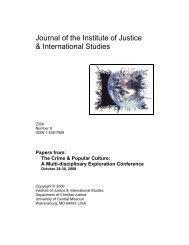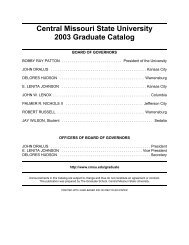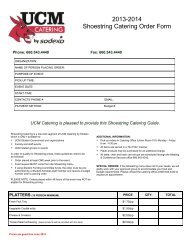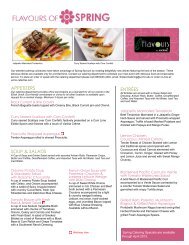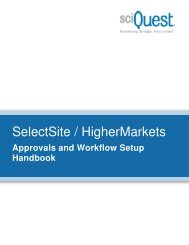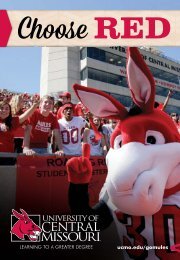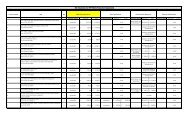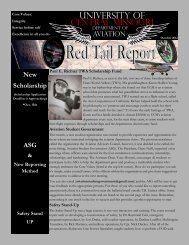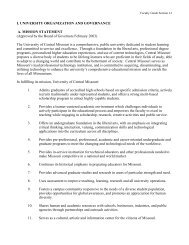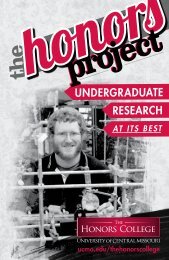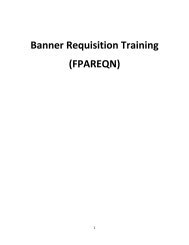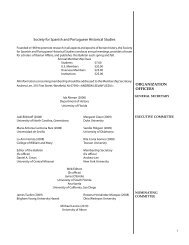IV. INSTITUTIONAL POLICIES AND PROCEDURES A ...
IV. INSTITUTIONAL POLICIES AND PROCEDURES A ...
IV. INSTITUTIONAL POLICIES AND PROCEDURES A ...
You also want an ePaper? Increase the reach of your titles
YUMPU automatically turns print PDFs into web optimized ePapers that Google loves.
Faculty Guide Section <strong>IV</strong>-1<br />
<strong>IV</strong>. <strong>INSTITUTIONAL</strong> <strong>POLICIES</strong> <strong>AND</strong> <strong>PROCEDURES</strong><br />
A. CONFIDENTIALITY OF PERSONNEL <strong>AND</strong> LEGAL RECORDS 1.2.070<br />
View the Board of Governors Policy on Central’s website at the following URL:<br />
http://www.ucmo.edu/upo/bog/policy.cfm?upoID=1.2.070<br />
B. ADMISSION TO CAMPUS EVENTS<br />
Faculty members, by presenting their Identification Card, may purchase admission tickets at faculty<br />
rates for themselves and a spouse or guest of their choosing.<br />
C. ALCOHOL POLICY 1.2.130<br />
View the Board of Governors Policy on Central’s website at the following URL:<br />
http://www.ucmo.edu/upo/bog/policy.cfm?upoID=1.2.130<br />
View the University Procedures and Guidelines, URL:<br />
http://www.ucmo.edu/upo/guide/policy.cfm?upoID=alcoholg<br />
View the alcohol statement at the following URL:<br />
http://www.cmsu.edu/uhc/drugfree.cfm<br />
D. BUSINESS <strong>AND</strong> FINANCIAL <strong>POLICIES</strong> <strong>AND</strong> <strong>PROCEDURES</strong><br />
Fiscal Responsibility<br />
ATTACHMENT I.<br />
View UCM Procedures and Guidelines, Fiscal Responsibility on Central’s website at the following<br />
URL: http://www.ucmo.edu/upo/bog/policy.cfm?upoID=fiscal&key=fiscal<br />
Long-Distance Telephone Calls. Each cost center manager is responsible for charges made to<br />
telephones in his or her area of administrative jurisdiction. Hence, the faculty member who places a<br />
long-distance call at university expense should first check with the department chair or dean because<br />
funds to support such telephone communications are limited. Printouts of charges to the telephones are<br />
distributed monthly to the cost centers.<br />
Mail Service. Mail Service privileges are available to all faculty members in the discharge of their<br />
professional responsibilities. Campus mail envelopes are to be used for inter-campus communications.<br />
All pieces of mail, which are distributed by the United States Postal Service at university expense, must<br />
have the correct cost center account number as part of the corner card. For more information regarding<br />
bulk mailings, insurance and certified mail, call the Printing Services Office.<br />
Purchasing Procedures. Purchases or purchase orders, which are to be paid from university budgets,<br />
must be given prior approval by the appropriate cost center managers and authorized by the Purchasing<br />
Office. Answers to questions regarding procurement procedures can be obtained by calling the<br />
Purchasing Office at 4001.
Faculty Guide Section <strong>IV</strong>-2<br />
E. CONFLICT OF INTEREST POLICY FOR EMPLOYEES 2.1.050<br />
View the Board of Governors Policy on Central’s website at the following URL: http://www.ucmo.edu/<br />
upo/bog/policy.cfm?upoID=2.1.050<br />
F. INTELLECTUAL PROPERTY RIGHTS, EDUCATIONAL MATERIALS, <strong>AND</strong> PATENT<br />
<strong>POLICIES</strong> (3/1/00)<br />
1. Intellectual Property Rights Policy. View the Board of Governors Policy on Central’s website at the<br />
following URL:<br />
http://www.ucmo.edu/upo/bog/policy.cfm?upoID=3.1.020<br />
View the Board of Governors Property Rights Procedure on Central’s website at the following URL:<br />
http://www.ucmo.edu/upo/guide/policy.cfm?upoID=IntellectualProperty<br />
2. Educational Materials. (3/1/00) It is the purpose of this policy statement to clarify the respective rights<br />
of faculty, staff, students and the university by defining the types of educational materials which should<br />
be designated "university-sponsored" by establishing procedures for administering policies concerning<br />
these materials, and stating university-wide policies governing their ownership and use and the rights to<br />
income produced.<br />
This policy does not affect the traditional ownership rights of faculty and staff to print or non-print<br />
educational materials other than those which were specifically commissioned by the university and the<br />
preparation of which were not supported or assisted in any substantial way by or through any university<br />
agency. The preparation and publication of texts utilizing secretarial and/or professional time are not to<br />
be considered substantial support.<br />
Section I. Coverage of Statement of Policy<br />
This statement of policy governs only the ownership and use of university-sponsored educational<br />
materials, as defined in Section II.<br />
Section II. Definition of University-Sponsored Educational Materials<br />
a. Educational materials are University-Sponsored:<br />
(1) If the author or producer has employed in developmental work, and without personal expense,<br />
substantial university resources, excluding normal secretarial assistance; or<br />
(2) If the author or producer has been both commissioned in writing by the university, or one of its<br />
colleges, departments, or agencies to develop the materials and, in their production, has received<br />
released time or for which the faculty member received compensation from university-administered<br />
funds.<br />
b. The types of educational materials to which this policy is designed to apply include, but are not<br />
necessarily limited to:<br />
(1) Video and audio recordings;<br />
(2) Films, film strips, charts, transparencies, and other visual aids;
Faculty Guide Section <strong>IV</strong>-3<br />
(3) Study guides, tests, syllabi, bibliographies and texts;<br />
(4) Programmed instructional materials;<br />
(5) Live video and audio broadcasts;<br />
(6) Computer programs and programmed instructional materials;<br />
(7) Other print and non-print materials subject to federal copyright.<br />
(8) Multimedia instructional material.<br />
(9) Inter-active television video (ITV), Internet, and distance learning materials.<br />
Section III. Ownership and Use of University Sponsored Educational Materials<br />
a. This policy is generally applicable to all University Sponsored Educational Materials unless other<br />
terms of agreement between the university, or one of its colleges, departments, or agencies (hereinafter<br />
referred to as the University) and the creator(s) (hereinafter referred to as the Creator) are specified in<br />
writing. Individual faculty members who intend to create educational materials or other products with<br />
University sponsorship are encouraged to enter into a contract or memorandum of understanding with<br />
the university that details the University sponsorship as well as rights to ownership and use of products<br />
and intellectual property created.<br />
b. Educational materials which do not satisfy the definition of University Sponsored Educational<br />
Materials (Section II of this policy) remain the property of the Creator. The University claims no<br />
specific rights to ownership or use of such products.<br />
c. Rights and limitations of the University and the Creator:<br />
(1) University Sponsored Educational Materials are the shared property of the University and the<br />
Creator.<br />
(2) The University maintains the right to use and to modify or revise University Sponsored Educational<br />
Materials for academic purposes.<br />
(3) In the event that the University uses, modifies, or revises University Sponsored Educational<br />
Materials, the original Creator shall have the option of removing his/her name from the modified/revised<br />
product without forfeiting his/her rights to use the original product.<br />
(4) The Creator retains the right to use University Sponsored Educational Materials, for noncommercial<br />
academic applications that do not involve violations of University Conflict of Interest or<br />
other policies. This includes, but is not necessarily limited to, the right to use the materials for teaching<br />
and/or publication in scholarly and professional journals.
Faculty Guide Section <strong>IV</strong>-4<br />
(5) In the event that the Creator’s employment with the University is separated or terminated, the<br />
Creator retains the right to use the University Sponsored Product for non-commercial purposes,<br />
including teaching and publication, as described above.<br />
d. University Sponsored Educational Materials and Commercial Value:<br />
(1) In the event that University Sponsored Educational Materials are determined to have a commercial<br />
value, the Creator and the University will share in monetary returns from commercial use. If no other<br />
agreement has been established between the Creator and the University, policies set forth in this section<br />
will apply. Products involving patents are covered in the Board of Governors Patent Policy located at<br />
the following URL: http://www.ucmo.edu/upo/bog/policy.cfm?upoID=3.1.030<br />
(2) Neither the University nor the Creator may independently prevent the commercial use of University<br />
Sponsored Educational Materials unless such commercial use is in violation of the University Conflict<br />
of Interest and Commitment Policy.<br />
(3) Proceeds from the commercial use of University Sponsored Educational Materials will go first<br />
to compensate the University for direct expenses equal to the actual, direct University expenditure<br />
(variable cost) to create the product. (University fixed or overhead costs will NOT be included.)<br />
(4) Proceeds beyond compensation for University expenses incurred in the creation of University<br />
Sponsored Educational Materials will be divided between the University (20%) and the Creator (80%).<br />
e. In the event that the development of educational material is jointly sponsored by the University and<br />
any external agency (public or private), a written agreement or memorandum of understanding will<br />
specify the ownership and use rights of each party. Such agreements should be developed and approved<br />
through the office of University Sponsored Research and the University Provost. (3-1-00)<br />
f. University faculty and staff may use copyrighted text, images, video and audio as part of curriculum<br />
based instructional activities with the permission of the owner(s) or with an exception to the rights<br />
of the owner(s) through an educational exemption, fair use exemption, or TEACH Act excmption as<br />
provided in Title 17 of the United States Code. Other portions of copyright legislation, such as the<br />
Digital Millennium Copyright Act, may also affect the legality of using copyrighted material without<br />
permission as part of curriculum based instruction and should, therefore, also be considered. The<br />
determination to seek permission or appropriately invoke an exemption must be made with each specific<br />
use of any copyrighted material for which a member of faculty or staff does not own the copyright.<br />
In case of a challenge, documentation of each determination must be maintained by the user of the<br />
copyrighted material.<br />
Copyright and Fair Use information is located at the following URL:<br />
http://library.ucmo.edu/copyright/<br />
3. Patent Policy.<br />
View the Board of Governors Policy on Central’s website at the following URL:<br />
http://www.ucmo.edu/upo/bog/policy.cfm?upoID=3.1.030<br />
G. ILLEGAL <strong>AND</strong> CONTROLLED DRUGS POLICY 1.2.140<br />
View the Board of Governors Policy on Central’s website at the following URL:<br />
http://www.ucmo.edu/upo/bog/policy.cfm?upoID=1.2.140
Faculty Guide Section <strong>IV</strong>-5<br />
H. TOBACCO USE POLICY 1.2.120<br />
View the Board of Governors Policy on Central’s website at the following URL: http://www.ucmo.edu/<br />
upo/bog/policy.cfm?upoID=1.2.120<br />
Use of Tobacco Guidelines:<br />
http://www.ucmo.edu/upo/bog/policy.cfm?upoID=tobaccoguide&key=tobacco<br />
I. IMMUNIZATION POLICY 1.2.110<br />
View the Board of Governors Policy on Central’s website at the following URL:<br />
http://www.ucmo.edu/upo/bog/policy.cfm?upoID=1.2.110<br />
The Immunization form is located on the Admissions’ website at the following URL:<br />
http://www.ucmo.edu/undergrad/hs/forms.cfm<br />
J. SEXUAL HARASSMENT POLICY<br />
It is the policy of University of Central Missouri to prohibit sexual harassment. Sexual harassment is<br />
a form of sexual discrimination and constitutes a violation of federal and state law. This policy applies<br />
to employment and academic relationships among faculty, staff and students and is intended to protect<br />
the rights of all persons within the university by providing fair and impartial investigations of all<br />
complainants brought to the attention of appropriate officials. Violations may lead to disciplinary action.<br />
Every attempt will be made to maintain confidentiality of all parties involved.<br />
1. Definition. Using the definition in the 1980 EEOC guidelines as a basis for this policy, sexual<br />
harassment is defined as follows:<br />
Unwelcome sexual advances, request for sexual favors and other verbal or physical conduct of a<br />
sexual nature constitutes sexual harassment when:<br />
a. submission to such conduct is made explicitly or implicitly a term or condition of an<br />
individual's employment or education,<br />
b. submission to or rejection of such conduct by an individual is used as the basis for employment<br />
or academic decisions affecting that individual,<br />
c. such conduct has the purpose or effect of substantially interfering with an individual's academic<br />
or professional performance, or creating an intimidating, hostile or offensive employment,<br />
academic or living environment.<br />
Sexual harassment, as defined above, is a prohibited and culpable practice at the university. Sexual<br />
harassment includes a range of behaviors -- none of which is acceptable when the recipient finds<br />
them offensive. Sexual harassment may include actions such as the following:<br />
●<br />
●<br />
●<br />
●<br />
Sex-oriented verbal "kidding" or abuse.<br />
Subtle pressure for sexual activity.<br />
Physical contact such as patting, pinching or constant brushing against another's body.<br />
Expressed or insinuated requests or demands for sexual favors, accompanied by implied or overt<br />
promises of preferential treatment or threats concerning an individual's employment or academic<br />
status.
●<br />
Faculty Guide Section <strong>IV</strong>-6<br />
Verbal or physical conduct of a sexual nature creating an intimidating, hostile or offensive<br />
working/academic/living environment.<br />
The General Counsel, Director of Human Resources, or Employee Relations Specialist will<br />
provide assistance in clarifying behavior, which may be interpreted as sexual harassment.<br />
2. Responsibilities. For this policy to be effective, communication channels must exist to inform<br />
students, faculty and staff about this policy. The Offices of the General Counsel and Human<br />
Resources, shall serve as resources with regard to sexual harassment concerns and shall work<br />
closely with administrators to ensure compliance with the policy. All administrators and<br />
supervisors are requested to take appropriate action to disseminate this policy and to inform<br />
persons of procedures for filing sexual harassment complaints. Accountability for compliance with<br />
this policy shall be the responsibility of each administrator and supervisor.<br />
3. Consenting Relationships.<br />
View the University Procedures and Guidelines on Central’s website at the following URL:<br />
http://www.ucmo.edu/upo/guide/policy.cfm?upoID=consentrelationships<br />
(Updated per Policy Office 12/10/07)<br />
K. DISCRIMINATION <strong>AND</strong> HARASSMENT: <strong>PROCEDURES</strong> FOR REPORTING <strong>AND</strong><br />
INVESTIGATING COMPLAINTS<br />
View UCM Procedures and Guidelines on Central’s website at the following URL:<br />
http://www.ucmo.edu/upo/bog/policy.cfm?upoID=discrimination&key=discrimination<br />
L. TRAVEL REGULATIONS<br />
1. View the Policy on Central’s website at the following URL:<br />
http://www.ucmo.edu/upo/guide/policy.cfm?upoID=travel<br />
2. Definition of Reimbursable Travel Expenses. Reimbursable travel expenses are those expenses<br />
authorized and incurred while transacting official business away from the campus site. Basic<br />
reimbursable expenses are such items as: personal transportation, lodging, meals, and registration<br />
fees for conferences and workshops. Registration fees are considered "travel" whether paid in<br />
advance or claimed for reimbursement on the Travel Expense Voucher, Form F-400.<br />
3. Travel Planning Approval. All travel plans should be discussed and funding determined in<br />
advance with the appropriate cost center administrator. The appropriate cost center administrator<br />
may grant blanket authorization for frequent and routine business travel. The appropriate cost center<br />
administrator may grant exceptions to the provisions of these regulations prior to travel.<br />
4. Travel on University Business. It is the responsibility of both the traveler and the approving<br />
authority to assure that all travel charged to the University is incurred for the benefit of the<br />
University, and that such travel is completed at the most economical and reasonable cost.<br />
5. Method of Reimbursement. Travel expenses may be reimbursed for actual reasonable expenses<br />
not to exceed the budget allocated to the cost center for that purpose. Each cost center may elect to<br />
restrict reimbursement amounts less than actual expenses.
Faculty Guide Section <strong>IV</strong>-7<br />
Cash Advance for Travel Expenses. Under some circumstances and within established restrictions, the<br />
University may make advances to individuals for certain travel expenses.<br />
a. Advances may be made for group/team travel.<br />
b. The group/team coach, leader or sponsor may request advances.<br />
c. Advances are not to exceed estimated expenses.<br />
d. Requests for advance of travel funds must be approved by the appropriate cost center<br />
administrator and submitted to Accounts Payable on the university Payment Request form.<br />
e. The approved Payment request form should reach Accounts Payable at least 5 workdays prior<br />
to the date the check is needed.<br />
f. Approved Travel Expense Vouchers (Form F-400) for completed group travel should be<br />
submitted to Accounts Payable within 10 workdays of returning from the trip.<br />
g. Any excess funds advanced must be repaid at the Revenue Office immediately following return<br />
from the trip and the receipt attached to the related Travel Expense Voucher (Form F-400).<br />
6. Transportation. The most economical available transportation, which will satisfactorily accomplish<br />
the University business, should be used. The following options are to be considered:<br />
a. Enterprise Rent-A-Car.<br />
A rental car should be used for all regional travel unless circumstances and conditions make<br />
the use of other types of transportation more advantageous to the university. A rental car is<br />
available by calling 660-429-3222 and accessing account G53617. Reservations must be made<br />
at least 24 hours in advance of travel. Specific Enterprise Rent-A-Car information is available<br />
on the Physical Plant web page.<br />
b. Use of University Vehicles.<br />
University-owned maxi-vans, cargo vans and people movers are available for use by groups<br />
of 5 or more. Reservations for university vehicle use must be made in advance by calling<br />
extension 4331. University gasoline credit cards are provided for the traveler’s use should<br />
additional fuel be needed. The cost will be charged for vehicle mileage at the appropriate<br />
current rate.<br />
c. Use of Privately-Owned Automobile.<br />
A privately-owned vehicle may be used in lie of using Enterprise Rent-A-Car. Reimbursement<br />
will be at the current rate per mile or the Enterprise car daily rate, whichever is less. Mileage is<br />
computed over the most commonly traveled route. Mileage will be reimbursed from and to the<br />
work site or residence, whichever is less.<br />
d. Guide for Drivers on State Business.
Faculty Guide Section <strong>IV</strong>-8<br />
Drivers of University and personal vehicles should request a copy of the "Guide for Drivers on<br />
State Business" from HR and follow the guidance on insurance, injuries, and accidents.<br />
e. Use of Commercial Airlines. Travel plans should be made, when possible, to allow for<br />
purchase of a 21 days in advance ticket. Incorporating a Saturday night into the travel schedule<br />
should be done if it results in a savings, considering additional meals and lodging, and does not<br />
result in a disruption of duties on campus.<br />
Reimbursement will be made for the mode of travel, which is the most economical for the<br />
University; not for the mode of travel that is the most convenient or preferred by the traveler.<br />
For cost comparison purposes between automobile and airline travel, the cost of commercial<br />
airline transportation is to be computed on the basis of purchasing a 21 days in advance of<br />
travel ticket and staying over a Saturday night, as verified by a travel agency.<br />
f. Use of University Aircraft. There are times when the use of a University aircraft is more<br />
practical and sensible than the use of other modes of transportation. The traveler should contact<br />
the airport director at extension 4921 for cost and schedule arrangement.<br />
g. Use of Privately-Owned or Rental Aircraft. Reimbursement will be made at the current rate<br />
per mile for privately-owned automobiles plus 4 cents per mile. The mileage to be reimbursed<br />
will be determined by the number of air miles. When more than one person travels in the<br />
same aircraft, only the employee who owned or rented the aircraft shall receive the mileage<br />
allowance.<br />
7. Lodging. Lodging accommodations are to be arranged and paid for by the traveler. Some hotels and<br />
motels grant favorable rates to University employees. Travelers are urged to check the availability of<br />
such rates (i.e. government rates) and take advantage of them. Conference rates are often not the best<br />
rate available. Travelers are expected to secure the most economical rate from the hotel. A copy of<br />
the University State tax exemption (available from Purchasing at extension 4001) should be furnished<br />
to hotels/motels, in Missouri only, to eliminate the Missouri State sales tax charge.<br />
8. Reimbursement for Travel Expenses.<br />
A. Reimbursements are not to exceed reasonable and actual meal costs, actual cost of lodging for the<br />
employee and other actual costs as approved by the cost center administrator.<br />
1. The traveler may claim the actual cost of meals and lodging subject to the approval of the cost<br />
center administrator.<br />
2. Original receipts for lodging must be submitted with the Travel Expense Voucher.<br />
3. A receipt must be submitted for individual meals costing $25.00 or more.<br />
4. Travel expense for friends and relatives are not authorized.<br />
5. When expenses are included in a registration fee (meals, lodging, transportation fares,<br />
official functions) or are otherwise furnished at no additional cost to the traveler, additional<br />
reimbursement shall not be claimed.
Faculty Guide Section <strong>IV</strong>-9<br />
B. Inclusions and Exclusions as to Authorized Expenses. In addition to meals and lodging, other<br />
expenses incurred as a necessary part of approved travel may be claimed:<br />
1. Authorized<br />
●<br />
●<br />
●<br />
●<br />
●<br />
●<br />
●<br />
●<br />
Registration fees (receipt required)<br />
Official telephone calls/fax/on-site copy costs<br />
Commercial transportation cost actually paid by the traveler (receipt required)<br />
Parking fees (receipt required)<br />
Mileage for use of a private vehicle or aircraft<br />
Rental vehicle cost (receipt required) including high deductible<br />
collision and comprehensive insurance coverage<br />
Road toll charges (receipt required)<br />
Tips<br />
2. Not authorized<br />
●<br />
●<br />
●<br />
●<br />
●<br />
Personal Entertainment expenses<br />
Personal expenses, such as laundry, valet service, etc.<br />
Alcoholic beverages<br />
Personal telephone calls<br />
Expenses for friends or relatives<br />
C. Contract and Grant Travel<br />
1. Sponsored Projects. If travel is on behalf of a sponsored grant or project and a limitation on<br />
the travel expenses reimbursement is set by the sponsor, then the more restrictive rate will<br />
apply, either that set by the university or that set by the sponsor.<br />
2. Combined Travel for Sponsored Projects and Other University Business. If travel is a<br />
combination of sponsored grant or project and other University business, University guidelines<br />
will apply and travel expense will be charged to both the sponsored project (but not in excess of<br />
the amount allowed by the sponsor) and to other University accounts as applicable.<br />
9. Preparation and submission of Travel Expense Voucher, Form F-400.<br />
a. Responsibility. Each individual who travels on University business and seeks reimbursement<br />
for approved expenses of that travel must submit a Travel Expense Voucher, Form F-400.<br />
b. Approval. In addition to the signature of the Payee, the form must be approved by the<br />
authorized cost center manager. If the two signatures would be the same, then the authorized<br />
signature of the person at the next higher level must be obtained.<br />
c. Submission. On proper completion including the attachment of all required original receipts,<br />
the form should be forwarded to Accounts Payable, Administration Building Room 304. The<br />
expense form is to be filed promptly, and not later than 10 days after return. Travel which<br />
begins and ends within a fiscal year must be budgeted for and the expenses paid and recognized<br />
in that fiscal year. Expenses for which reimbursement is not claimed within these parameters<br />
and the fiscal year is closed will not be paid.
Faculty Guide Section <strong>IV</strong>-10<br />
d. Pre-Audit of Travel Expenses. The Accounts Payable Office will audit the expense<br />
form for compliance with regulations, mathematical accuracy, account coding and proper<br />
authorization(s).<br />
e. Payment of Travel Claims. Payment for travel reimbursement may be expected to be in<br />
the mail within six (6) workdays following receipt of the properly approved voucher in the<br />
Accounts Payable Office.<br />
f. Waiver of state taxes. Presentation of a tax-exempt letter to hotels and motels upon<br />
check-in will usually result in these charges being eliminated from the bill. A taxexempt<br />
letter is available from Purchasing. Additional information concerning Travel<br />
Guidelines may be viewed at the following link: http://www.ucmo.edu/upo/index.cfm?<br />
pg=policy.cfm&upoID=travel<br />
M. UN<strong>IV</strong>ERSITY STORE DISCOUNT POLICY<br />
The University Store has a wide range of merchandise for sale. Upon presentation of the staff ID card,<br />
employees are given a 10% discount on all merchandise except required textbooks, postage stamps,<br />
special orders, college rings, computer hardware and software, and sale merchandise.<br />
N. RESPONSIBLE CONDUCT OF RESEARCH<br />
All research that involves human subjects must follow the policies developed by the Human Subjects<br />
Committee. (See Academic Procedures & Regulations Number 9)<br />
All research that involves animal subjects must follow the policies developed by the UCM Institutional<br />
Animal Care and Use Committee.<br />
ETHICS IN RESEARCH DOCUMENT<br />
1. Preamble. Integrity in scholarship and research is an essential part of University of Central<br />
Missouri's intellectual and social structure, and adherence to its spirit and principles must be<br />
maintained. These principles include commitment to truth, objectivity, fairness, honesty, and free<br />
inquiry.<br />
Although serious violations of honesty in scholarship and research may be rare, those that do occur<br />
strike at the very heart of the research/creative enterprise. Advances in scientific knowledge depend<br />
on trustworthy data and honestly reported conclusions. Advances in humanistic studies depend<br />
upon gathering and interpreting legitimate information in a manner which other scholars, operating<br />
in good faith, can judge and replicate. Artists present portfolios and performances, which reflect a<br />
unique artistic statement and point of view. Anything less will seriously undermine the total research/<br />
creative enterprise and erode public confidence in those responsible for its conduct. Moreover, in<br />
any academic institution dedicated to education, scholars and researchers have a special obligation to<br />
exemplify the very best qualities and the highest standards of personal and professional conduct.
Faculty Guide Section <strong>IV</strong>-11<br />
The integrity of the process of research and scholarship must depend largely on self-regulation; it is<br />
the responsibility of all who engage in search for knowledge. Advances are gleaned from vigorous<br />
application of scientific and scholarly methods and in compliance with ethical codes rooted in<br />
intellectual honesty.<br />
Dishonesty is often an unfortunate response to environmental temptations, and detection in advance<br />
of those who are most susceptible is difficult, if not impossible. Therefore, major attention should be<br />
directed toward the following:<br />
a. encouraging intellectual honesty;<br />
b. discouraging "success at any cost";<br />
c. accepting responsibility for integrity;<br />
d. maintaining professional interpersonal relationships;<br />
e. establishing and maintaining well-defined research protocols;<br />
f. appropriately assigning credit and responsibility.<br />
2. Purpose.<br />
a. University of Central Missouri is responsible for the integrity of research conducted at the<br />
university. As a community of scholars, in which truthfulness and integrity are fundamental,<br />
the university must establish procedures for the investigation of allegations of scholarly or<br />
scientific misconduct.<br />
b. It is the purpose of these procedures to set forth guidelines for efficient disclosure and<br />
resolution of accusations of scientific or scholarly misconduct in a manner that (1) protects<br />
the public from the results of misconduct, (2) protects innocent scientists and scholars from<br />
retribution or harassment or interference with their academic freedom, and (3) protects from<br />
retribution the individual who unmaliciously presents evidence of misconduct.<br />
3. Definitions.<br />
a. Scientific or scholarly misconduct means willful deception or intent to deceive in any scientific<br />
or scholarly endeavor.<br />
b. The exact nature of the misconduct may vary with the discipline, but it essentially includes the<br />
following:<br />
(1) fabrication and falsification of data,<br />
(2) intentional use of unreliable research methods,<br />
(3) intentional distortion or misinterpretation of research data or results,<br />
(4) plagiarism,
Faculty Guide Section <strong>IV</strong>-12<br />
(5) other serious deviations from accepted practices in proposing, carrying out, or reporting<br />
results from scientific or scholarly activities,<br />
(6) violation of federal, state, or institutional rules on research involving human subjects,<br />
animals, genetically engineered materials, new drugs and devices and radioactive materials.<br />
c. The misconduct may appear in the content of a grant proposal, published manuscript, work of<br />
art, film, news release, or any other expression of scientific or scholarly activity.<br />
d. Scientific or scholarly misconduct does not include honest error or honest differences in<br />
interpretations or judgments about data or texts.<br />
e. The complainant is the person who reports possible misconduct to the mediator.<br />
f. The mediator is the person who, in conjunction with the Dean of the Graduate School and<br />
Extended Studies and the President of the Faculty Senate (FS) determine whether there is<br />
(are) sufficient reason(s) to conduct an inquiry into the alleged misconduct and acts as a<br />
communications link (or conduit) between the Dean of the Graduate School and Extended<br />
Studies, the FS President, the complainant, respondent, and (if the matter reaches those stages)<br />
the bodies conducting the inquiry and investigation.<br />
g. The mediator is the chair of the FS Ethics in Research Committee (FSERC). If the complainant<br />
is dissatisfied with the mediator's response, then the alleged misconduct may be reported to the<br />
University Provost. The President of the University is the final institutional mediator and may<br />
be contacted by the complainant if responses at the other levels are found unsatisfactory.<br />
h. The respondent is the person accused of scientific or scholarly misconduct. This person may<br />
be an employee or appointee of University of Central Missouri or be under the supervision of a<br />
University of Central Missouri employee or appointee.<br />
i. The inquiry is the informal information gathering process to determine whether the allegation of<br />
misconduct warrants an investigation. The inquiry is conducted by the FSERC.<br />
j. The investigation is the formal examination of all relevant information to determine whether<br />
the alleged misconduct has occurred. A panel drawn from the FS Arbitration Pool conducts the<br />
investigation.<br />
4. Reporting of Alleged Scientific and Scholarly Misconduct.<br />
Any Central faculty member, staff member, student or person unaffiliated with University of Central<br />
Missouri who believes that scientific or scholarly misconduct has occurred may submit a written<br />
allegation to the mediator.<br />
5. Confidentiality
Faculty Guide Section <strong>IV</strong>-13<br />
To the extent allowed by law, we shall maintain the identity of respondents and complainants securely<br />
and confidentially and shall not disclose and identifying information, except to: (1) those who need to<br />
know in order to carry out a thorough, competent, objective and fair research misconduct proceeding;<br />
and (2) ORI as it conducts its review of the research misconduct proceeding and any subsequent<br />
proceedings.<br />
To the extent allowed by law, any information obtained during the research misconduct proceeding that<br />
might identify the subjects of research shall be maintained securely and confidentially and shall not be<br />
disclosed, except to those who need to know in order to carry out the research misconduct proceeding.<br />
6. Research Misconduct Proceedings- Criteria, Reports, and Time Limitations<br />
Promptly after receiving an allegation of research misconduct, defined as a disclosure of possible<br />
research misconduct through any means of communication, we shall assess the allegation to determine<br />
if: (1) it meets the definition of research misconduct in 42 CFR Section 93.103; (2) it involves either the<br />
PHS supported research, applications for PHS research support, or research records specified in 42 CFR<br />
Section 93.102(b); and, (3) the allegation is sufficiently credible and specific so that potential evidence<br />
of research misconduct may be identified.<br />
If it is determined that an inquiry (i.e. an initial review of the evidence to determine if the<br />
criteria for conducting an investigation have been met) is warranted, we shall complete the inquiry,<br />
including preparation of the inquiry report and giving the respondent a reasonable opportunity to<br />
comment on it, within 60 calendar days of its initiation, unless the circumstances warrant a longer<br />
period.<br />
If the inquiry takes longer than 60 days to complete, we shall include the documentation of the reasons<br />
for the delay in the inquiry record. The inquiry report shall contain the following information: (1) The<br />
name and position of the respondent(s); (2) A description of the allegations of research misconduct; (3)<br />
The PHS support involved, including, for example, grant numbers, grant applications, contracts, and<br />
publications listing PHS support; (4) The basis for recommending that the alleged actions warrant an<br />
investigation; and (5) Any comments on the report by the respondent or the complainant.<br />
The mediator, in conjunction with the Dean of the Graduate School and Extended Studies and the<br />
President of the Faculty Senate, will make a written determination of whether an investigation is<br />
warranted. If the inquiry results in a determination that an investigation is warranted, we shall begin<br />
the investigation within 30 calendar days of that determination, and on or before the date on which the<br />
investigation begins, send the inquiry report and the written determination to the ORI. We shall use<br />
our best efforts to complete the investigation within 120 calendar days of the date on which it began,<br />
including conducting the investigation, preparing the report of findings, providing the draft report for<br />
comment, and sending the final report to ORI.<br />
If it becomes apparent that we cannot complete the investigation within that period, we shall promptly<br />
request an extension in writing from ORI.<br />
In the event of scientific or scholarly misconduct the university will provide the respondent with an<br />
appeal opportunity. A written appeal of the investigative committee’s decision is to be addressed to<br />
the Provost. Grounds for appeal should be limited to failure to follow appropriate procedures in the<br />
investigation or arbitrary and capricious decision making. The appeal must be filed within two working<br />
days of a finding of scientific misconduct. Evaluating of the appeal must be completed within 120 days<br />
of its commencement. If the appeal process cannot be completed within 120 days, the university may
Faculty Guide Section <strong>IV</strong>-14<br />
request an extension in writing from ORI. (This time period does not apply to separate termination<br />
hearings.) The decision of the appeal is final.<br />
In conducting all investigations, we shall: (1) Use diligent efforts to ensure that the investigation is<br />
thorough and sufficiently documented and includes examination of all research records evidence<br />
relevant to reaching a decision on the merits of the allegations; (2) Interview each respondent,<br />
complainant, and any other available person who has been reasonably identified as having information<br />
regarding any relevant aspects of the investigation, including witnesses identified by the respondent,<br />
and record or transcribe each interview, provide the recording or transcript to the interviewee for<br />
correction, and include the recording or transcript in the record of the investigation; (3) Pursue diligently<br />
all significant issues and leads discovered that are determined relevant to the investigation, including<br />
any evidence of additional instances of possible research misconduct, and continue the investigation to<br />
completion; and (4) Otherwise comply with the requirements for conducting an investigation in 42 CFR<br />
Section 93.310<br />
We shall prepare the draft and final institutional investigation reports in writing and provide the draft<br />
report for comment as provided elsewhere in these policies and procedures and 42 CFR Section 93.312.<br />
The final investigation report shall:<br />
1. Describe the nature of the allegations of research misconduct;<br />
2. Describe and document the PHS support, including, for example any grant numbers, grant<br />
applications, contracts, and publications listing PHS support;<br />
3. Describe the specific allegations of research misconduct considered in the investigation;<br />
4. Include the institutional policies and procedures under which the investigation was conducted, if<br />
not already provided to ORI;<br />
5. Identify and summarize the research records and evidence reviewed, and indentify any evidence<br />
taken into custody, but not reviewed. The report should also describe any relevant records and<br />
evidence not taken into custody and explain why.<br />
6. Provide a finding as to whether research misconduct did or did not occur for each separate allegation of<br />
research misconduct identified during the investigation, and if misconduct was<br />
found, (i) identify it as falsification, fabrication, or plagiarism and whether it was intentional, knowing,<br />
or in reckless disregard, (ii) summarize the facts and the analysis supporting the conclusion and consider<br />
the merits of any reasonable explanation by the respondent and any evidence that rebuts the respondent’s<br />
explanations, (iii) identify the specific PHS support; (iv) identify any publications that need correction<br />
or retraction, (v) identify the person(s) responsible for the misconduct, and (vi) list any current support<br />
or known applications or proposals for support that the respondent(s) has pending with non-PHS Federal<br />
agencies; and (7) include and consider any comments made by the respondent and complainant on the<br />
draft investigation report.<br />
We shall maintain and provide to ORI upon request all relevant research records and records of our<br />
research misconduct proceeding, including results of all interviews and the transcripts or recordings of<br />
such interviews.<br />
7. Ensuring a Fair Research Misconduct Proceeding<br />
We shall take all reasonable steps to ensure an impartial and unbiased research misconduct<br />
proceeding to the maximum extent practicable. We shall select those conducting the inquiry or<br />
investigation on the basis of scientific expertise that is pertinent to the matter and, prior to<br />
selection, we shall screen them for any unresolved personal, professional, or financial conflicts<br />
of interest with the respondent, complainant, potential witnesses, or others involved in the
Faculty Guide Section <strong>IV</strong>-15<br />
matter. Any such conflict which a reasonable person would consider to demonstrate potential<br />
bias shall disqualify the individual from selection.<br />
8. Notice to Respondent<br />
During the research misconduct proceeding, we shall provide the following notifications to all identified<br />
respondents:<br />
●<br />
●<br />
●<br />
●<br />
●<br />
●<br />
●<br />
Initiation of Inquiry. Prior to or at the beginning of the inquiry, we shall provide the<br />
respondent(s) written notification of the inquiry and contemporaneously sequester all research<br />
records and other evidence needed to conduct the research misconduct proceeding. If the inquiry<br />
subsequently identifies additional respondents, they shall be promptly notified in writing.<br />
Comment on the Inquiry Report. We shall provide the respondent(s) an opportunity to comment<br />
on the inquiry report in a timely fashion so that any comments can be attached to the report.<br />
Results of the Inquiry. We shall notify the respondent(s) of the results of the inquiry and attach<br />
the notification copies of the inquiry report and these institutional policies and procedures for the<br />
handling of research misconduct allegations.<br />
Initiation of Investigation. Within a reasonable time after our determination that an investigation<br />
is warranted, but not later than 30 calendar days after that determination, we shall notify the<br />
respondent(s) written notice of any new allegations within a reasonable time after determining to<br />
pursue allegations not addressed in the inquiry or in the initial notice of the investigation.<br />
Scheduling of Interview. We will notify the respondent sufficiently in advance of the scheduling<br />
of his/her interview in the investigation so that the respondent may prepare for the interview and<br />
arrange for the attendance of legal counsel, if the respondent wishes.<br />
Comment on Draft Investigation Report. We shall give the respondent(s) a copy of the draft<br />
investigation report, and concurrently, a copy of, or supervised access to, the evidence on which<br />
the report is based and notify the respondent(s) that any comments must be submitted within 30<br />
days of the date on which he/she received the draft report. We shall ensure that these comments<br />
are included and considered in the final investigation report.<br />
Appeal. We shall give the respondent timely notification of the appeal process.<br />
9. Notifying ORI of the Decision to Open an Investigation and of Institutional Findings and<br />
Actions Following the Investigation.<br />
On or before the date on which the investigation begins (the investigation must begin within 30 calendar<br />
days of our finding that an investigation is warranted), we shall provide ORI with the written finding by<br />
the Dean of the Graduate School and Extended Studies and a copy of the inquiry report containing the<br />
information required by 42 CFR Section 93.309(a) (. Upon a request from ORI we shall promptly send<br />
them: (1) a copy of our institutional policies and procedures under which the inquiry was conducted; (2)<br />
the research records and evidence reviewed, transcripts or recordings of any interviews, and copies of all<br />
relevant documents; and (3) the charges for the investigation to consider.<br />
We shall promptly provide to ORI after the investigation: (1) A copy of the investigation report, all<br />
attachments, and any appeals; (2) A statement of whether the institution found research misconduct,
Faculty Guide Section <strong>IV</strong>-16<br />
and, if so, who committed it; (3) A statement of whether the institution accepts the findings in the<br />
investigation report; and (4) A description of any pending or completed administrative actions against<br />
the respondent.<br />
10. Maintenance and Custody of Research Records and Evidence<br />
We shall take the following specific steps to obtain, secure, and maintain the research records and<br />
evidence pertinent to the research misconduct proceeding:<br />
1. Either before or when we notify the respondent of the allegation, we shall promptly<br />
take all reasonable and practical steps to obtain custody of all research records and evidence<br />
needed to conduct the research misconduct proceeding, inventory those materials, and<br />
sequester them in a secure manner, except tin those cases where the research records or<br />
evidence encompass scientific instruments shared by a number of users, custody may be<br />
limited to copies of the data or evidence on such instruments, so long as those copes are<br />
substantially equivalent to the evidentiary value of the instruments.<br />
2. Where appropriate, give the respondent copies of, or reasonable, supervised access to the<br />
research records.<br />
3. Undertake all reasonable and practical efforts to take custody of additional research records<br />
and evidence discovered during the course of the research misconduct proceeding, including<br />
at the inquiry and investigation states, or if new allegations arise, subject to the exception for<br />
scientific instruments in (1) above.<br />
4. We shall maintain all records of the research misconduct proceeding, as defined in 42<br />
CFR Section 93.317(a) for 7 years after completion of the proceeding, or any ORI or HHS<br />
proceeding under Subparts D&E of 42 CFR Part 93, whichever is later, unless we have<br />
transferred custody of the records and evidence to HHS, or ORI has advised us that we no<br />
longer need to retain the records.<br />
11. Interim Protective Actions<br />
At any time during a research misconduct proceeding, we shall take appropriate interim actions to protect public<br />
health, federal funds and equipment, and the integrity of the PHS supported research process. The necessary<br />
actions will vary according to the circumstances of each case, but examples of action that may be necessary<br />
include delaying the publication of research results, providing for closer supervision of one or more researchers,<br />
requiring approvals for actions relating to the research that did not previously require approval, auditing pertinent<br />
records, or taking steps to contact other institutions that may be affected by an allegation of research misconduct.<br />
Notifying ORI of Special Circumstances that may Require Protective Actions<br />
At any time during a research misconduct proceeding, we shall notify ORI immediately if we have<br />
reason to believe that any of the following conditions exist:<br />
1. Health or safety of the public is at risk, including an immediate need to protect human or animal<br />
subjects.<br />
2. HHS resources or interests are threatened.<br />
3. Research activities should be suspended.<br />
4. There is a reasonable indication of violations of civil or criminal law.
Faculty Guide Section <strong>IV</strong>-17<br />
5. Federal action is required to protect the interests of those involved in the research misconduct<br />
proceeding.<br />
6. We believe the research misconduct proceeding may be made public prematurely, so that HHS<br />
may take appropriate steps to safeguard evidence and protect the rights of those involved.<br />
7. We believe the research community or public should be informed.<br />
12. Institutional Actions in Response to Final Findings of Research Misconduct<br />
We will cooperate with and assist ORI and HHS, as needed, to carry out any administrative actions HHS<br />
may impose as a result of a final finding or research misconduct by HHS.<br />
13. Restoring Reputations<br />
Respondents. We shall undertake all reasonable, practical, and appropriate efforts to protect and restore<br />
the reputation of any person alleged to have engaged in research misconduct, but against whom no<br />
finding of research misconduct was made, if that person or his/her legal counsel or other authorized<br />
representative requests that we do so.<br />
Complainants, Witnesses, and Committee Members. We shall undertake all reasonable and practical<br />
efforts to protect and restore the position and reputation of any complainant, witness, or committee<br />
member and to counter potential or actual retaliation against those complainants, witnesses, and<br />
committee members.<br />
14. Cooperation with ORI<br />
We shall cooperate fully and on a continuing basis with ORI during its oversight reviews of this<br />
institution and its research misconduct proceedings and during the process under which the respondent<br />
may contest ORI findings or research misconduct and proposed HHS administrative actions. This<br />
includes providing, as necessary to develop a complete record of relevant evidence, all witnesses,<br />
research records, and other evidence under our control or custody, or in the possession of, or accessible<br />
to, all persons that are subject to our authority.<br />
Reporting to ORI. We will report to ORI any proposed settlements, admissions of research misconduct,<br />
or institutonal findings of misconduct that arise at any stage of a misconduct proceeding, including the<br />
allegation and inquiry stages.<br />
Related Resources<br />
UCM Ethics Policy<br />
Ethics Procedure<br />
Whistleblower Procedures<br />
O. Regulations and Guidelines Regarding Technology at UCM
Faculty Guide Section <strong>IV</strong>-18<br />
Because the nature of technology is one of rapid change, Technology regulations and guidelines are<br />
maintained on the Office of Technology web site, www.ucmo.edu/ot. Examples of these regulations and<br />
guidelines include, but are not limited to, such documents as:<br />
Network Security Regulations<br />
Use, Acquisition and Support of Technology<br />
Email Regulations<br />
Copyright and the DMCA<br />
Purchasing Standards<br />
Software Support<br />
UCM Acceptable Use Guidelines<br />
Any questions about Technology regulations and guidelines at UCM may be directed to the Technology<br />
Support Center at 660-543-4357 or tsc@ucmo.edu."



